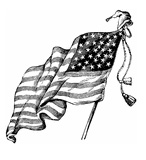
America: A Christian Country?
A JEWISH VIEW
Some time ago a Southern governor referred to the United States as “a Christian country.” The media were unanimous in their denunciation, while my liberal and Jewish friends derided him as a bigot and a fool. My reaction was a bit different. When I first heard his description of this country, I thought, “What an optimist!” Perhaps my and my family’s background can explain my attitude.
My mother was born in Russia just before the turn of the century. Her most vivid memory of early childhood was the pogrom of 1905. She and her family were hidden for three days in the home — at times under the table — of a friendly Christian family. The woman of the house placed icons in the window to make clear to the mob that it was not a Jewish home. My grandfather, a rabbi, had to be restrained from rushing outside in his unwillingness to be saved by images of Jesus and the saints. Nevertheless, the family was unhurt, while persons they knew were beaten to death. My mother was too young to have any memory other than fear. An older brother felt discomfort at the sound of church bells for the rest of his life. His memory of the pogrom starting in the churchyard overcame his memory of being saved by Christians. Soon after, the family emigrated to the U.S. After a brief stay on the Lower East Side, they settled in North Dakota, where my mother attended the university.
My father was born in the area of Poland that was ruled by the Czar. The hatred to which he and his peers were subjected was returned in kind. The older boys taught him to spit when passing a church — surreptitiously, of course. His most salient memory of later childhood was seeing notices for jobs or places at the university, all of which ended with the proviso “Except Jews.” Unwilling to serve in the army that supported such a system, he emigrated to New York as a teenager. He arrived with no money, no knowledge of English, and no high school diploma. He still managed to put himself through school, while taking time off to serve — proudly — as a private in the infantry in France in World War I. He later applied to various medical schools, where admission for Jews was limited by quotas. Ultimately, he was admitted to the University of North Dakota, where he met and married my mother. At the time it was a two-year medical school, and for the additional two years my father transferred to St. Louis University, a Jesuit school.
My parents set up medical practice in Lisbon, North Dakota, a town of 2,000 inhabitants — in those days one said “souls” — and at length my mother became pregnant. The obstetrician informed them that a Caesarian section would be needed. My father decided to take her to the hospital where he had interned. It was a Catholic hospital, but my father had been well treated, and he trusted the people there. Things went well, and I was born. All in all, this was not a bad outcome for the little girl who hid under the table and the little boy who spat when passing churches.
You May Also Enjoy
Levada behaved as though he had been parachuted into a minefield and his job was to emerge without setting off any mines.
The ITC states that "in the history of the people of God, it has often been not the majority but rather a minority which has truly lived and witnessed to the faith."
The right attitude and a little preparation can turn a rude comment into an opportunity to witness to your faith.

